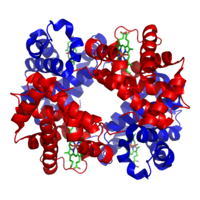
A drop in the circulating concentrations of soluble receptor for advanced glycation end products is associated with seroconversion to autoantibody positivity but not with subsequent progression to clinical disease in children en route to type 1 diabetes
Sign Up to like & getrecommendations! Published in 2017 at "Diabetes/Metabolism Research and Reviews"
DOI: 10.1002/dmrr.2872
Abstract: Advanced glycation end products (AGEs) and their interaction with the receptor for AGEs (RAGE) have been studied for their role in the pathogenesis and complications of type 1 diabetes. Decreased concentrations of soluble RAGE (sRAGE)… read more here.
Keywords: concentrations soluble; type diabetes; end products; glycation end ... See more keywords

Unveiling the molecular mechanisms underpinning biorecognition of early-glycated human serum albumin and receptor for advanced glycation end products
Sign Up to like & getrecommendations! Published in 2020 at "Analytical and Bioanalytical Chemistry"
DOI: 10.1007/s00216-020-02674-w
Abstract: Serum levels of early-glycated albumin are significantly increased in patients with diabetes mellitus and may play a role in worsening inflammatory status and sustaining diabetes-related complications. To investigate possible pathological recognition involving early-glycated albumin and… read more here.
Keywords: affinity; early glycated; serum; end products ... See more keywords

Intrauterine hyperglycemia-induced inflammatory signalling via the receptor for advanced glycation end products in the cardiac muscle of the infants of diabetic mother rats
Sign Up to like & getrecommendations! Published in 2017 at "European Journal of Nutrition"
DOI: 10.1007/s00394-017-1536-6
Abstract: PurposeGestational diabetes is associated with increased risk to the health of the mother and her offspring. In particular, the infants of diabetic mothers (IDMs) exhibit elevated levels of preterm birth, macrosomia, hypoglycemia, hypocalcemia, and cardiomyopathy.… read more here.
Keywords: intrauterine hyperglycemia; infants diabetic; mother; end products ... See more keywords

Methylglyoxal-derived advanced glycation end products contribute to negative cardiac remodeling and dysfunction post-myocardial infarction
Sign Up to like & getrecommendations! Published in 2017 at "Basic Research in Cardiology"
DOI: 10.1007/s00395-017-0646-x
Abstract: Advanced glycation end-products (AGEs) have been associated with poorer outcomes after myocardial infarction (MI), and linked with heart failure. Methylglyoxal (MG) is considered the most important AGE precursor, but its role in MI is unknown.… read more here.
Keywords: glo1; end products; glycation end; post ... See more keywords

Effect of plant polyphenols on the formation of advanced glycation end products from β-lactoglobulin
Sign Up to like & getrecommendations! Published in 2017 at "Food Science and Biotechnology"
DOI: 10.1007/s10068-017-0053-y
Abstract: Dietary exposure to advanced glycation end products (AGEs) formed from proteins and reducing sugars is of increasing concern to human health. AGEs may form in protein-based powders containing sugars for instant beverages during drying and… read more here.
Keywords: plant; formation; effect; end products ... See more keywords

Advanced glycation end products as a source of artifacts in immunoenzymatic methods
Sign Up to like & getrecommendations! Published in 2017 at "Glycoconjugate Journal"
DOI: 10.1007/s10719-017-9805-4
Abstract: The most abundant proteins in the arteries are those of extracellular matrix, ie. collagen and elastin. Due to their long half-lifes these proteins have an increased chance to undergo glycation. The aim of this study… read more here.
Keywords: advanced glycation; age; end products; glycation end ... See more keywords

Metabolic transit of dietary advanced glycation end-products - the case of NƐ-carboxymethyllysine.
Sign Up to like & getrecommendations! Published in 2020 at "Glycoconjugate journal"
DOI: 10.1007/s10719-020-09950-y
Abstract: The Maillard reaction, also called glycation, is one of the major chemical reactions responsible for most yellow-to-brown colors and aromas in cooked foods. This reaction between reducing sugars and amino functions on proteins affects not… read more here.
Keywords: advanced glycation; end products; glycation end; metabolic transit ... See more keywords

The Role of Advanced Glycation End-Products in Cancer Disparity.
Sign Up to like & getrecommendations! Published in 2017 at "Advances in cancer research"
DOI: 10.1016/bs.acr.2016.08.001
Abstract: While the socioeconomic and environmental factors associated with cancer disparity have been well documented, the contribution of biological factors is an emerging field of research. Established disparity factors such as low income, poor diet, drinking… read more here.
Keywords: advanced glycation; end products; disparity; glycation end ... See more keywords

Dietary advanced glycation end products and their relevance for human health
Sign Up to like & getrecommendations! Published in 2018 at "Ageing Research Reviews"
DOI: 10.1016/j.arr.2018.06.005
Abstract: Due to their bioactivity and harmful potential, advanced glycation end products (AGEs) are discussed to affect human health. AGEs are compounds formed endogenously in the human body andexogenously, especially, in foods while thermal processing. In… read more here.
Keywords: human health; end products; glycation end; advanced glycation ... See more keywords

Therapeutic options to reduce advanced glycation end products in patients with diabetes mellitus: A review.
Sign Up to like & getrecommendations! Published in 2019 at "Diabetes research and clinical practice"
DOI: 10.1016/j.diabres.2018.11.016
Abstract: Diabetes mellitus (DM) defines metabolic disorders, characterised by elevated levels of blood glucose. Chronic hyperglycaemic state promotes consequently the formation of advanced glycation end products (AGEs) and the expression of their receptor (RAGE) which aggravate… read more here.
Keywords: therapeutic options; end products; diabetes mellitus; glycation end ... See more keywords

Association of advanced glycation end products with diabetic retinopathy in type 2 diabetes mellitus.
Sign Up to like & getrecommendations! Published in 2021 at "Diabetes research and clinical practice"
DOI: 10.1016/j.diabres.2021.108880
Abstract: AIMS Advanced glycation end products (AGEs) were reported to be associated with diabetes development and diabetes related complications when accumulated in high levels. This study investigated the association between AGEs and diabetic retinopathy (DR). METHODS… read more here.
Keywords: diabetic retinopathy; association; type diabetes; end products ... See more keywords